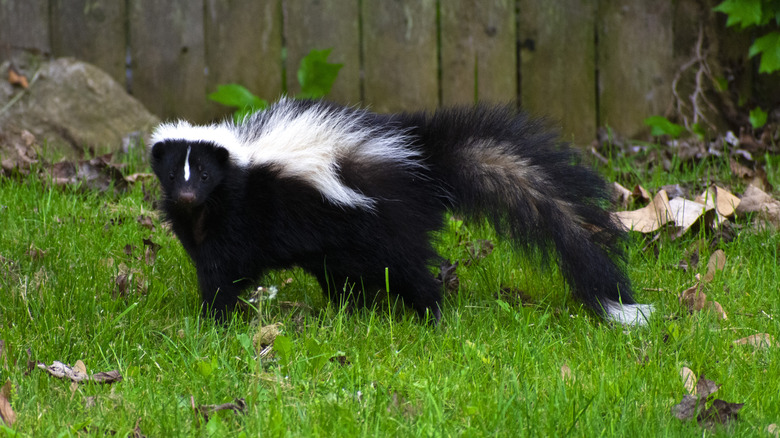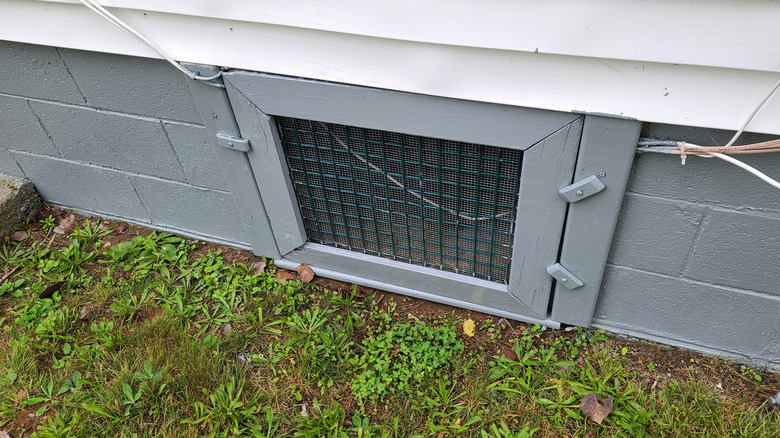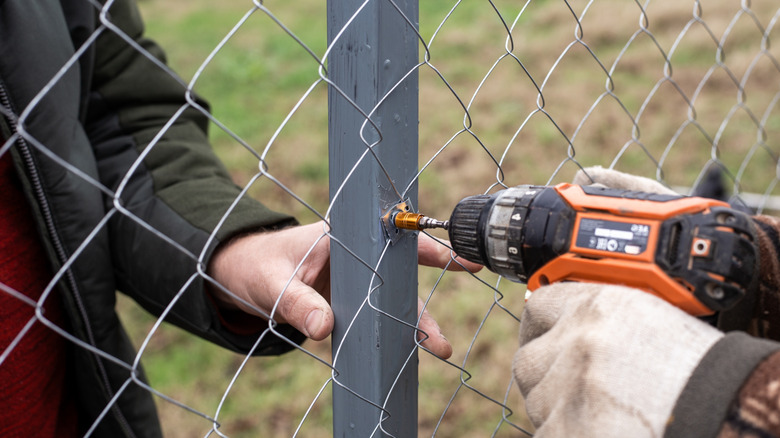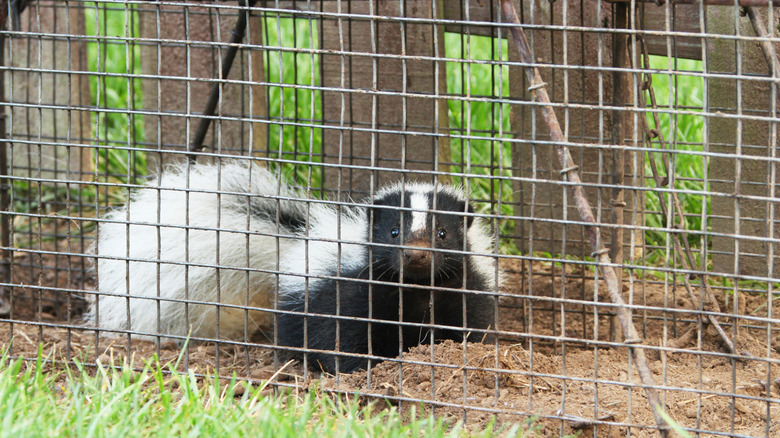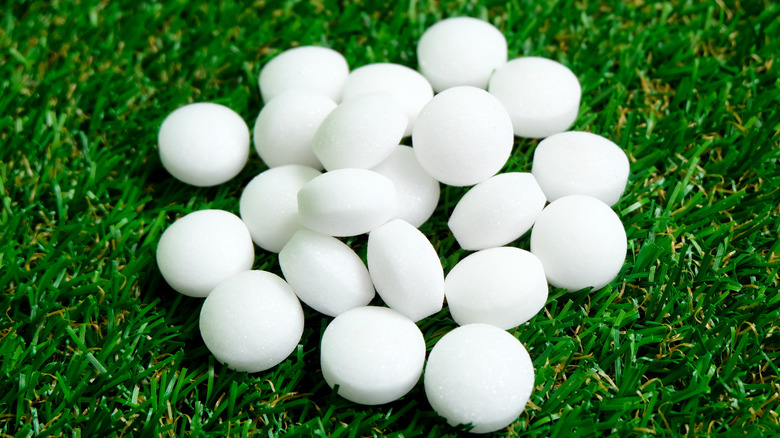How To Keep Skunks Out Of Your Yard And Prevent Them From Coming Back
If you have ever come across a family of skunks, their signature scent may have been the only thing keeping you from letting them parade into your living room. Even if you aren't so fond of nature, baby skunks are pretty freaking adorable — especially when they are still small enough to fit in the palm of your hand.
That said, these little stinkers can cause just as much damage as some of their less cute woodland friends, whether it involves knocking over trashcans, ripping up sod, or munching their way through your vegetable garden. They also leave foraging holes, which is one of the best tells that you have a skunk problem — though usually, you'll know before that, as skunks are so mild-tempered and only partially nocturnal that you'll often see one (or two) putzing about right in front of you. And of course, while property damage is one thing, the primary reason you don't want a skunk at your home is the, well ... smelly impact that they're likely to have on your pets, kids, or (if you're not careful enough) you.
It's no wonder you're wondering what you can put in your yard to keep skunks away. Luckily, there are a lot of ways to help repel or remove them from your property without causing harm. To help reduce trial and error, let's go over some tips and tricks that just may work. We'll stick with ones that are more humane, more successful — and depending on your state, more legal — than reaching for a makeshift weapon and yelling at them to get off your lawn.
To get rid of skunks, eliminate food sources and clean up your yard
One of the primary draws for any kind of wildlife is food, and if you have been finding your garbage cans toppled, ripped, and gnawed at, you may have unknowingly been the provider of a late night, all-you-can-eat skunk buffet. Keeping your garbage secure and safe from prying paws alone may be enough to get the skunks to move on to another establishment. If possible, store your trash and recycling bins inside your garage. If and when you do need to place it outside, opt for a metal can with a tight-fitting lid. A locking lid or bungee cord provides an additional layer of protection, and even better if you are able to secure your cans in an upright position. Whatever you do, stop leaving them bulging with overflowing trash (unless you like having skunks, that is).
What if your trash is sealed, though, and you still have skunks? In that case, you should probably consider other possible food sources you might have on the property — namely bird seed and compost piles. Though this might not initially come to mind as a skunk attractant, these both make pretty tasty treats for the omnivorous eaters. Compost, for instance, not only has great food scraps, but also draws delicious (to the skunks) insects. And after the skunks polish off your birdseed, they'll even eat the birds themselves!
Seal up any housing possibilities for your skunk pests
Second to food, a skunk is looking for a cozy place to call home. While they have been known to dig their own dens, such a rigorous DIY approach is usually a last resort for these creatures, which prefer homes of the turnkey variety. Skunk-approved housing generally constitutes a small hidden and covered space — sometimes underground. Though they may go for a burrow that was already left by other animals, their favorite human-made homes consistent of areas like the underside of porches, rock crevices, drainpipes, and crawlspaces.
In order to keep skunks from accessing these places, your best course of action is to try and eliminate the entrances for any open spaces under the home. If you have free access to that lovely space under the porch, or if you have a board loosely placed over your crawlspace entrance instead of a real door, now is the time to fix that. Sealing off these entrances is usually enough to discourage them, and it could also be helpful in keeping other creatures from making your house their home.
Some skunks prefer earthier homes, though, so also rid the area of wood or rock piles. If you find holes in your yard that you suspect to be a den or have the potential to become one, first be sure that there are no current residents, but once empty, you can fill it with packed dirt.
Consider installing a fence to keep skunks away
If you don't want skunks to even enter your yard, putting in a quality fence is the way to go. Since they (surprisingly!) are not particularly good climbers, the fence doesn't need to be much higher than three feet off the ground, but you will want to sink some mesh down at least a foot to discourage them from digging underneath it. Some wildlife removal companies even suggest going as deep as three feet (!), so if you have a serious skunk problem, you may want to err on the side of caution and dig deep. Very deep.
You can also use an "exclusion fence" which would give them an electric shock if they came in contact with it. The shock is mild enough that it won't cause them any real harm, but strong enough to deter them from trying again. If you opt for a wooden fence, you will want to be sure that you used treated wood, as otherwise there is a chance that they may chew their way through the fence. Either way, a fence is a big decision, and before you install one, do your research and choose the fence material that is the best for you.
Naturally repel skunks with scents they hate
What do skunks hate the most? While you might enjoy the scent of a freshly peeled orange, or eucalyptus oil in your shower, it appears that skunks would beg to differ. This is actually a good thing, because certain essential oils and plant-based scents that people think smell good could be enough to get skunks running for hills.
For the sake of clarity, it doesn't appear that there is any scientific evidence to either support or debunk claims of essential oils being used as a skunk deterrent. That said, that's often the case with essential oil remedies, and pest control companies say that skunks are allegedly quite averse to citrus scents, peppermint, eucalyptus, and lavender, all of which can be diluted with water and sprayed around your property. Plus, these essential oils can also be used inside the home, so if you buy them and they don't work on skunks, you can use them in other fun ways.
Capsaicin — an oil found in peppers — is also believed to be an effective deterrent. Not only does it have a strong scent, but it also has a powerful taste that can make what was once a skunk delicacy into a culinary disaster. These remedies are generally safe for people, but you do want to check that every essential oil you use is safe for other animals, especially if you have any pets that roam the grounds.
Trap and release the skunks (probably with professional help)
When it comes down to it, the most effective and most humane course of action to fix a skunk problem in your yard is ... well, to trap and release your skunks. Since they can dig and build their own burrows, after all, blocking off your home or spraying essential oils may not be enough to keep them away. If you do manage to trap a skunk, though, you won't want to be the person to relocate and release it, unless you are particularly skilled and knowledgeable at such things. Not only do you risk getting sprayed, but skunks are also one of the predominant carriers of rabies, so if you get so much as scratched, you might be in for some serious medical attention.
The safest option for both you and your local skunk is to call a wildlife control company. They will have both the means and knowledge on how to handle and release the animal safely into a proper environment for its survival. Before trapping your skunk and picking up the phone, you may want to be sure to look up your state's guidelines as to whether the skunk will to be euthanized or relocated.
Finally, avoid natural DIY remedies that don't actually work
Two of the most commonly suggested skunk deterrents are mothballs and predator urine. Unfortunately, both of these options come with some negative consequences, ranging from deeply problematic to a smelly nuisance.
We'll start with the worse one. Mothballs — like essential oils — keep skunks away with their scent, but since a mothball is something physical that they can grab onto, they can remove it from their den area. This could lead to the mothball ending up in the yard where it could easily be eaten by children and dogs — and it's not good for either party if that happens, considering they are highly toxic.
The predator urine solution has some issues of its own, albeit different and less dangerous ones. It is commonly used to keep away animals like groundhog, deer, and rabbits, but skunks don't really let this deter them, according to wildlife experts. So if you do try this approach, it could result in your lawn being soaked in coyote urine (and the accompanying smells of it), as well as having skunk stench from your still-present skunks that aren't super-worried about coyotes. Ultimately, as the above options demonstrate, there are enough techniques that are cheaper, better for the environment, and smell better. These two are just not worth the risk, hassle, or stink.
